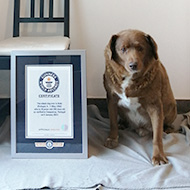
The Rafeiro do Alentejo has broken two records at once.
A 30-year-old Rafeiro do Alentejo has been officially named the world's oldest dog living, and the oldest dog ever by the Guinness World Records.
Bobi, born on 11 May 1992 in the village of Conqueiro, Portugal, has lived with the same family all his life. Indeed, owner Leonel Costa was only eight years old when Bobi was born, and lives with him to this day.
Registered with Serviço Medico-Veterinário do Município de Leiria (Veterinary Medical Service of the Municipality of Leiria) in 1992, Bobi is aged 30 years and 266 days old as of 1 February 2023.
Verified by both Serviço Medico-Veterinário do Município de Leiria and the Portuguese government, Bobi's extraordinary age makes him the oldest dog ever to be recorded.
Described by his owners as calm and sociable, Bobi has lived with many animals throughout his life and loves to play with the four cats he currently lives with.
Leonel discussed his dog's long life: “Bobi has been a warrior for all these years, only he knows how he's been holding on, it must not be easy because the average dog’s life span is not that high and if he spoke only he could explain this success.
“We are very happy and grateful to life for allowing us, after 30 years, to have Bobi in our daily lives.”
Having had only one health scare in 2018, Bobi's daily life is just like that of any other dog. He loves walking around the farmland where he lives and relaxing by the fireplace on cold days. Bobi mostly eats the same food as his owners, with care taken to soak the food in water to remove the seasoning first.
Bobi has taken over the record for the oldest dog ever from an Australian cattle dog named Bluey, who lived to 29 years and five months old. He takes the title of oldest dog living from Spike, an Ohio-based canine aged 23 years and seven months old, as verified in December 2022.
Leonel continued: “Bobi is special because looking at him is like remembering the people who were part of our family and unfortunately are no longer here, like my father, my brother, or my grandparents who have already left this world. Bobi represents those generations.”
For the full story on Bobi's life, visit the Guinness World Records website.
Images (C) GUINNESS WORLD RECORDS



 The Federation of Independent Veterinary Practices (FIVP) has announced a third season of its podcast, Practice Matters.
The Federation of Independent Veterinary Practices (FIVP) has announced a third season of its podcast, Practice Matters.